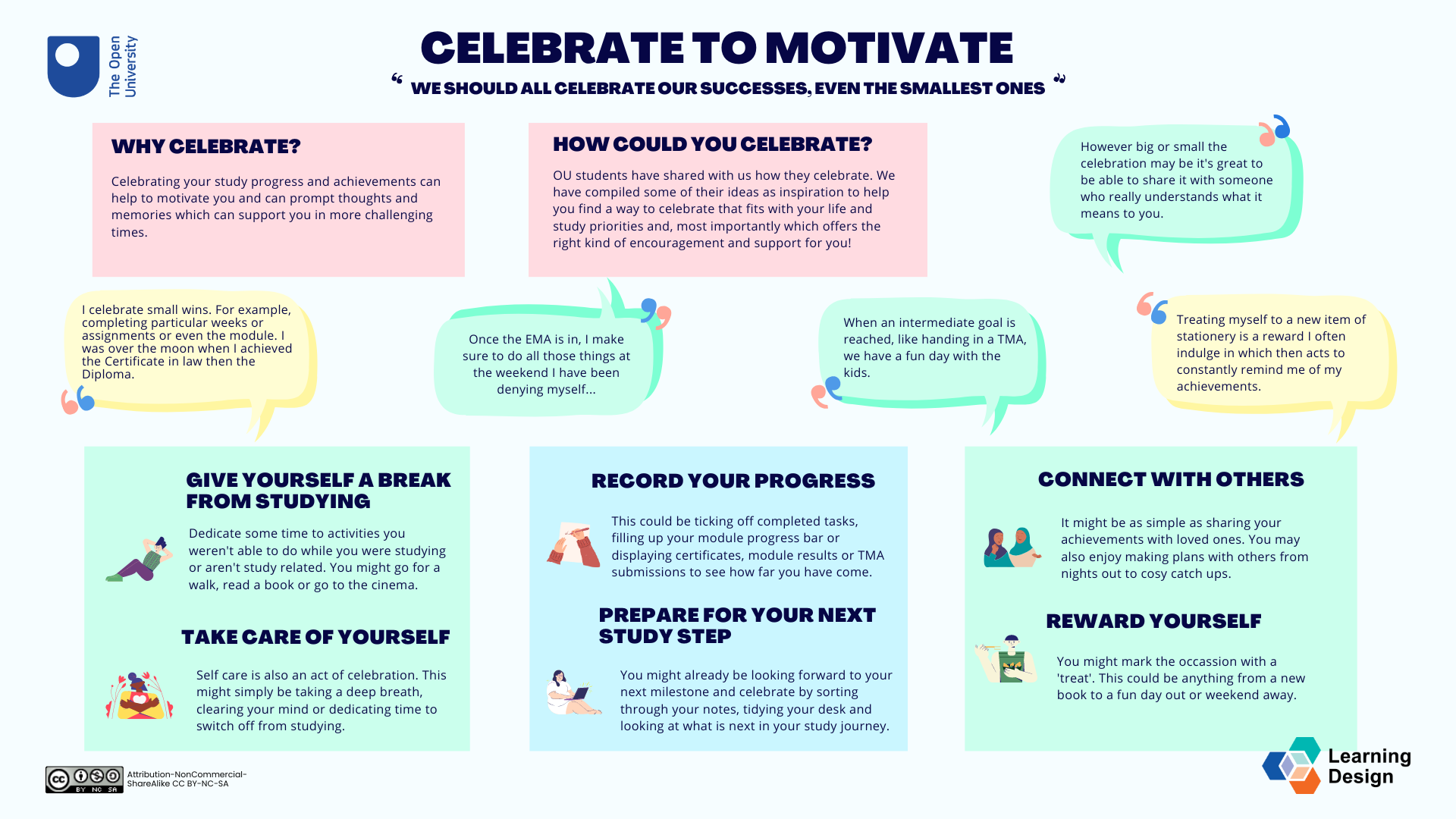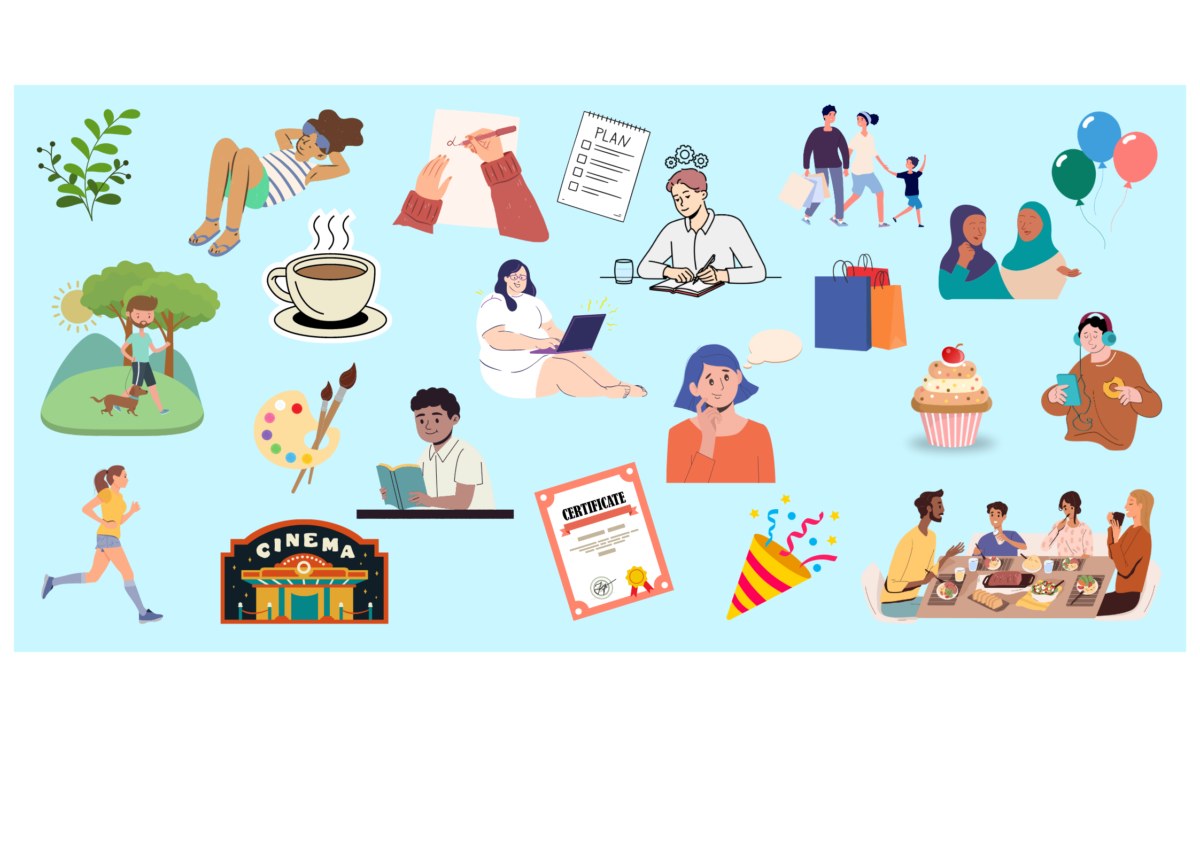Catriona Matthews, Clare Hill, James Openshaw ~ Learning Designers
Here at The Open University, we annually recruit a panel of students called the Curriculum Design Student Panel. Students who volunteer for the panel take part in activities designed to gather their views on learning experiences and this feedback can be used to inform the early development of activities, materials and tools. We also ask panel students a ‘Question of the Month’ in a forum, which is usually a brief question about their study experience.
Recently, we asked panel students to tell us how they celebrate their achievements, big and small. Whilst a seemingly light-hearted question, it led to some useful insights about the student experience. There was a lively discussion in the forum with panel students sharing what they considered to be celebratory study events and telling us how celebrating is beneficial to their study. It even led to some panel students vowing to start celebrating or to celebrate more, so the discussion had an immediate positive effect on those involved.
The reasons for celebration ranged from finishing a task right through to achieving a qualification, and everything in between. Some students cited direct benefits such as how the celebration motivated them to complete their next study step. We also saw that some of the ways students celebrated resulted in indirect benefits, such as creating a bank of positive memories or reconnecting with family and friends to seek support and encouragement, both of which are useful at times when study is challenging.
We identified six themes, which students’ acts of celebration fell within, and these neatly describe the strategies any student might use to celebrate a study step or achievement:
- Give yourself a break from studying
- Take care of yourself
- Connect with others
- Reward yourself
- Record your progress
- Prepare your next study step

Student celebration poster (click image to expand – opens in new tab)
How students chose to enact these strategies varied and is arguably unimportant as the act is entirely dependent on each student’s individual circumstances and preferences. However, taking time to celebrate using any one or a combination of strategies, alone or with peers, benefited motivation and supported students’ wellbeing.
Celebration and cognitive performance
Let’s take a quick look at the particular benefits of one of these themes, taking a break. Students can often place undue pressure on themselves through the expectation that they should continually be studying and that not doing so is wasting precious study time. However, research has shown taking time out from study or work, be that mini-breaks, lunchtime breaks or longer ones, can have a positive effect on wellbeing and productivity. Breaks have been found to be important in recovering from stress and can restore energy and mental resources which in turn can improve performance. (Geurts, Beckers and Tucker, 2014)
Time out from studying does not have to be long either. There is research to show that mini-breaks of only a few minutes away from work or study help support mental wellbeing and boost productivity, with relaxation and social activities in particular being beneficial, such as chatting with someone or getting a drink. (Kim, Park and Niu, 2017)
However, it is not only the benefit to your energy levels and wellbeing that taking a break offers. It can also help with the processing of memories and can enable us to make sense of what we are learning. An important 2012 study (Immordino-Yang et al., 2012) used an fMRI scanner to gain insights into the brain’s neural activity during a state of rest, and it revealed how our minds are still highly active, with different regions lighting up as we focus on things other than study or work. Subsequent studies have shown the key role this ‘rest mode’ plays in how we make sense of our experiences through consolidating memories, reflecting on the past and contemplating of the future. It is evident that breaks are important for the health of our brains and in maintaining our cognitive functions which in turn helps us learn more effectively.
Celebration and student outcomes
Are there any links between celebration and student outcomes? Stanislas Dehaene says in How We Learn (2020) that rewarding students’ efforts is one way we can help them to develop a growth mindset. A growth mindset is a belief that intellectual abilities can be developed, as opposed to the fixed mindset where intellectual abilities are believed to be unchangeable (Yeager and Dweck, 2020). Creating an environment in which the act of learning is celebrated in preference to the demonstration of learning (through assessment scores), could help students to recognise their growing intellectual ability, and thereby develop a growth mindset. This could be beneficial to student outcomes because research tells us that people with a growth mindset “are more likely to thrive in the face of difficulty and continue to improve”, with a stronger effect being observed in those who are at risk for poor outcomes (Yeager and Dweck, 2020). So, developing students’ growth mindset through celebratory activities might contribute to improved student outcomes, as well as supporting wellbeing and providing immediate motivation.
Connecting with peers, family members or other personal networks to celebrate successes may also contribute to the construction of social communities and support, which in turn can lead to improved student outcomes. Shweta Mishra’s (2020) literature review of social networks, social capital, social support, and academic success in higher education indicates a link between support from families, residential groups, neighbourhoods, religious networks etc and positive results for academic success, retention, and achievement. Among marginalised or underrepresented student groups, where information-related social capital may be low, high levels of care, positive attitudes and motivation/encouragement can have a positive influence on academic outcomes.
Celebration and community
Sharing successes of all types and sizes with student peers may also contribute to feelings of ‘connectedness’ with peers, staff, and the University. According to Di Malta et al. (2022), feelings of connectedness help to mediate the relationship between ‘academic performance and wellbeing and between loneliness and wellbeing’. Students who are less satisfied with their academic performance arguably are less likely to celebrate small moments of success which may contribute to feelings of disconnection and loneliness.
Encouraging celebration
There are many ways we could create an environment for our students that encourages celebration of learning. For distance learners, strategically placed short online questionnaires could encourage reflection on what students learned through completing their assignments. In tutorials, you might ask students to reflect on and celebrate how their knowledge has grown. Maybe skills development could be mapped and acknowledged using a self-assessment tool. Whatever the approach, be sure to encourage celebration without judgement and focus on celebrating the incremental process of developing ability (growth mindset) rather than validating existing competence (fixed mindset). (Yeager and Dweck, 2020)
References
Dehaene, S. (2020) How We Learn, Penguin Books Ltd.
Di Malta, G., Moller, N. (2022) ‘University connectedness, relational depth, wellbeing, anxiety and academic achievement in FASS students’, FASSTEST Final Project Report. (Internal only)
Geurts, S. A. E., Beckers, D.G.J., Tucker, P. (2014) ‘Recovery from demanding work hours. An introduction to contemporary work psychology’, 2014 ;196–219. Available at https://psycnet.apa.org/record/2014-32531-008. Accessed on 29 March 2023.
Immordino-Yang, M. H., Christodoulou, J. A. and Singh, V. (2012) ‘Rest Is Not Idleness: Implications of the Brain’s Default Mode for Human Development and Education’. Perspectives on Psychological Science; Sage Journals [Internet]. Available at https://journals.sagepub.com/doi/abs/10.1177/1745691612447308. Accessed on 29 March 2023.
Kim, S., Park, Y., Niu Q. ‘Micro-break activities at work to recover from daily work demands’. Journal Organizational Behavior [Internet]. 2017 Jan 1; 38(1):28–44. Available at http://doi.wiley.com/10.1002/job.2109. Accessed on 29 March 2023.
Mishra, S. (2020). ‘Social networks, social capital, social support and academic success in higher education: a systematic review with a special focus on ‘underrepresented’ students’, Educational Research Review. Available at: https://doi.org/10.1016/j.edurev.2019.100307. Accessed on 12 February 2023.
Yeager, D. S. and Dweck, C. S. (2020) ‘What can be learned from growth mindset controversies’, American Psychologist. Available at https://web-s-ebscohost-com.libezproxy.open.ac.uk/ehost/pdfv…. Accessed on 9 February 2023.
[Banner image: James Openshaw, via Canva]

